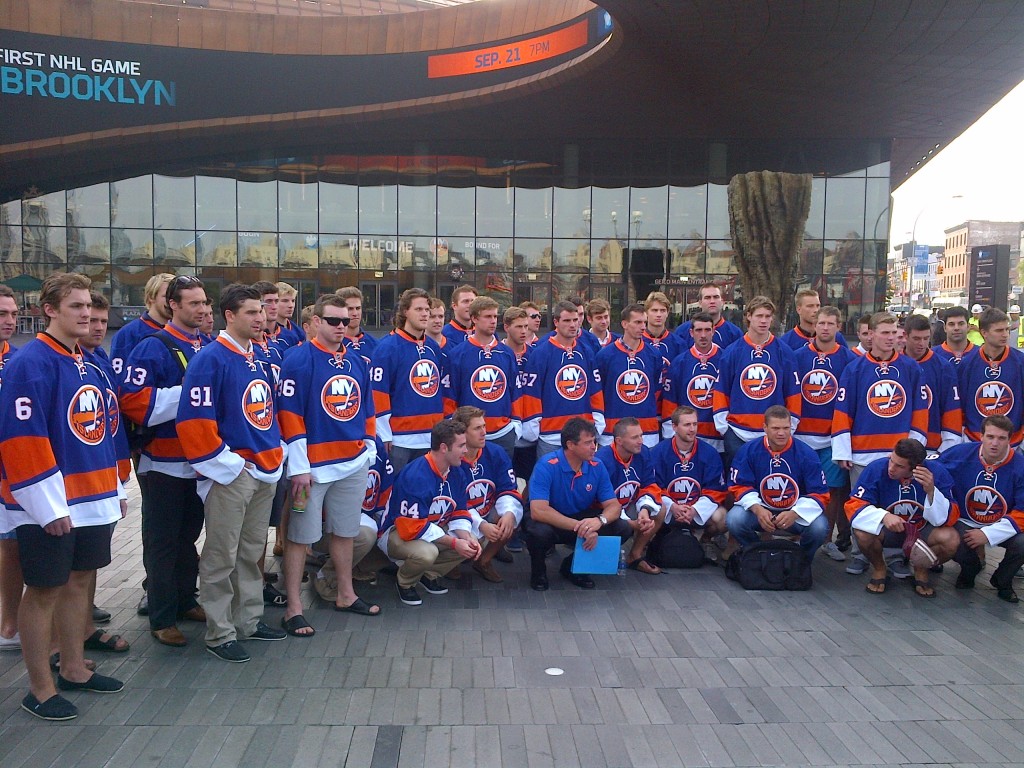
In moving from Long Island to New York City, I could finally distance myself from the team I loathe. Until now. (mtaphotos / Flickr)
I hate few things about Long Island. I love the sleepy bedroom communities I spent my childhood passing on the Long Island Rail Road, the days spent at fresh sand beaches or on rocky North Shore trailways, and quiet afternoons in the backyard of my mother’s ranch home in the small hamlet of Greenlawn.
But I hate the New York Islanders. I hate their history–an upstart expansion team that went on to win four consecutive Stanley Cup trophies in the mid-1980s. I hate their fans–brooding suburbanites who always manage to support the winning side whenever they come to Madison Square Garden to square off against my beloved Rangers. I hate their jerseys–from the Gorton’s Fisherman-inspired doldrums of the 1995-96 season to their fashionable, Nets-inspired black and silver they’ll wear as an alternate jersey next season. But most of all, I hate that they’re down the street from my Clinton Hill apartment–a stone’s throw away from my decidedly un-suburban neighborhood. I hate the thought of this team being associated with Brooklyn for countless reasons, but most of all, I hate the loss of the Islanders as Long Island’s team.
Long Island is a study in contrasts. It is home to remarkable natural beauty, as well as the ugliness and ill-conceived design now derided as suburban sprawl. Home to some of the world’s wealthiest people, it is also known as one of America’s most segregated regions, where even blacks and latinos making upwards of $75,000 live in neighborhoods with greater poverty than whites making $40,000 per year. There’s a certain understanding of the island’s cultural divide as well: one only needs to ask if one is from the “north” or “south” shore to conjure a thumbnail sketch of a person’s social perspective. It’s a question that is uniquely Long Island–as easily perceived as insulting as it is reaffirming of one’s association and understanding of place. No matter where one is from on the island, there is a certain revulsion to the idea of being anything but middle-class. Within my hometown of Greenlawn, one could drive a BMW into the high school parking lot and still consider himself from a middle-class family. To stand out as a self-defined member of the one percent would bring social isolation and snickers from classmates–even if we, in reality, were all far from the 99 percent. There is a certain pride in being blue collar on Long Island (even if one’s collar is decidedly white), no doubt passed down from latter generations who hailed from Brooklyn, Staten Island, or Queens that saw Long Island as a path toward prosperity from urban poverty. Many of those who call the island home still associate with their working-class, immigrant roots, even if they are now hedge fund managers and bankers.
This too carries over into sports. Being an Islanders fan means taking pride in doing more with less: a lesser stadium, a lesser roster of players, and a lesser market than the Rangers–a team that plays only blocks from Times Square’s bright lights. New York City dominates the suburban experience and, in many ways, detracts from what it means to be a Long Islander. The island’s culture and history cannot help but be overshadowed by the city, which predominates local news coverage, global public perception, and leaves suburbanites feeling decidedly provincial. The Islanders, however, provide a sense of place. The team, historically, was for Nassau and Suffolk county residents. Its former home, the Nassau Veterans Coliseum, was accessible only by car, with forebodingly large parking lots surrounding the diminutive structure. Being an Islanders fan meant embracing your roots; it meant being proud of your knowledge of what separates an expressway from a parkway, and knowing immediately that your accent stood out as soon as you left the east coast (even if you, like me, falsely believed you had no accent of which to speak). To root for the Islanders meant–quite literally–rooting for your neighbors, with many players living in the hamlets that dot the region.
Which made being a Rangers fan a challenge. I came of age following the historic 1994 Stanley Cup championship, and was hooked from the day my father took me to their celebratory ticker tape parade in lower Manhattan. I wore my oversized Brian Leetch jersey with pride–even to middle school picture day in sixth grade. Every time I wore the Rangers’ red, white, and blue, I would face scorn not only from my schoolmates, but also from full-grown adults who could not conceive the reasons I’d root for the “city” team when I had a perfectly good alternative only a county away. I was a traitor to my kind; a Long Islander willing to forgo one of the few cultural staples my suburb had. The doctors at my mom’s hospital, where she was a nurse for over 20 years, would offer her Islanders tickets. I would decline. I would struggle to watch scrambled broadcasts of Rangers games when we could not afford the expensive sports TV package. When they did broadcast games on basic cable, I would shut off games if they started to lose out of fear of cursing the team. Being young and in the depths of the Rangers years of terrible acquisitions, I watched far fewer games than I should have for fear of making an already-lackluster team even worse. The jinx of an unlucky 9-year-old wouldn’t have made their situation any worse than their aging roster of hockey’s has-beens did.
After losing my father unexpectedly when I was 11, my love for the Rangers–our team–only grew. I no longer felt uncomfortable for wearing my jersey, the one with my dad’s handwriting on the inside collar spelling out my name. It was through the Rangers that I could still feel like he was with me; the sound of pucks hitting sticks at Madison Square Garden is the same now as it did then. The smell of hot dogs, knishes, and light beer still reminds me of him to this day. Soon too, I found my best friend to be a closeted Rangers fan as well, only strengthening our bond. Despite him being in Los Angeles and me in Brooklyn, we still make a point go to a game every December. My mom has also gotten in on the allure of hockey, becoming an even bigger fan of the team than I am and only strengthening the bond we both share. The Rangers may not have been the Long Island team, but they came to define my Long Island childhood. Rooting for the underdog, I learned, meant different things to different people. My world was my mother, and my friends. That was the community with which I self-identified, whether or not that meant putting on the orange and blue of my team’s arch-rivals.
With the Islanders moving to Brooklyn, generations of fans will lose what was an incredibly important part of what it meant to be from Long Island. Brooklyn is, at the risk of hyperbole, everything that Long Island is not: order a single-origin pour-over coffee in Hicksville, and you’ll be summarily dismissed. Seek out a quinoa salad at an Irish pub, and you might face an even worse fate. Long Islanders with fond memories of the team’s powerhouse years will find the Barclays center to have none of the charm of the Coliseum. In a mephistophelean deal to keep the team from completely relocating to far-off, hockey-starved locales like Kansas City, Islanders owner Charles Wang opted instead to remove the heart of what made the Islanders special. A team that was named for a community that clamored for something of its own. Something unique. Something that, despite its challenges, was theirs alone.
I’ll hate having the Islanders down the street from me. Not because of the impending onslaught of hipsters in Mike Bossy jerseys, but because my neighbors deserve better. They deserve a hometown team. In a city of transplants, the Islanders are set to be new kids in a big, uncaring city. They deserve the right to be hated, instead of ignored.
.
 Brian O’Connor is senior blog editor for The Brooklyn Quarterly and deputy web editor at Foreign Affairs. Follow him @briantoconnor_ or brianoconnor.nyc.
Brian O’Connor is senior blog editor for The Brooklyn Quarterly and deputy web editor at Foreign Affairs. Follow him @briantoconnor_ or brianoconnor.nyc.
